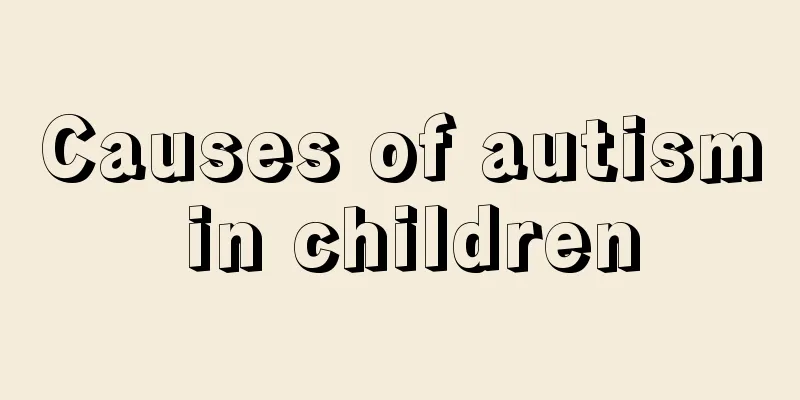Six-year-old child has blood in stool but no pain

|
If a six-year-old child has blood in his stool without any pain, it is often a symptom caused by rectal polyps. If a child has symptoms of bloody stools and is not treated promptly, it is likely to cause developmental delay or even cessation of development. In severe cases, it may also lead to dangerous conditions such as weak heart function and intestinal perforation. Below, we will introduce in detail the causes, hazards and prevention methods of bloody stools in children. 1. What causes blood in children's stools? When children have blood in their stool, it is mostly caused by rectal polyps. Generally, the blood in the stool caused by polyps is bright red, slightly painful, and the blood does not mix with the stool. If children have paroxysmal abdominal pain, a lump can be felt in the right lower abdomen, or their bloody stools are jam-like, you should be highly alert to the occurrence of intussusception in children. If you have the above symptoms, you should go to the hospital in time to avoid delaying the disease. If your child has blood in his stool, you must be vigilant. Take him to a regular hospital for examination and treatment in time. 2. The harm of blood in stool in children Long-term chronic blood in the stool will inevitably cause children to develop slowly or stop developing. In severe cases, it may also affect the child's heart function, dizziness, fainting, and intellectual development. Therefore, parents should be vigilant and pay great attention to it. Once they find that their children have symptoms of blood in the stool, they should take active measures to diagnose and treat them. Blood in the stool is not uncommon in children. The appearance may be that blood and stool are mixed or not mixed. The stool may appear bright red, pink, dark red or black. Some stools have normal color, but blood in the stool is detected during stool testing. This is medically known as positive fecal occult blood. Moreover, blood in the stool is often not accompanied by other symptoms in children, and children generally do not have other adverse reactions, so it is easily ignored by parents. Children may have blood in the stool at any age from birth to adulthood. Different diseases may cause blood in the stool at different ages. In school and preschool periods, serious complications such as intestinal obstruction and intestinal perforation often occur due to untimely diagnosis and treatment of the primary disease causing blood in the stool, thus affecting the physical and mental health and academic performance of children. 3. Prevention of bloody stools in children Once blood in the stool is discovered, timely diagnosis and treatment should be sought to avoid delaying the disease. Additional suggestions: 1. Let children develop the habit of regular bowel movements, and it is best if the stool is in a thin, mushy state. 2. Reduce postures that increase abdominal pressure, such as squatting and holding your breath. Avoid sitting, standing, walking for long periods of time and overwork. 3. Avoid spicy, greasy, rough, and residue-rich foods. |
<<: What should I do if my three-year-old baby has a bad mouth?
>>: Is swollen lymph nodes serious in children?
Recommend
At what age is it better for children to sleep alone?
Children are very cute and like to sleep next to ...
Is it useful to use honeysuckle to wash baby eczema?
Eczema is a common skin disease in infants. So, d...
What is the best way to treat baby allergies?
Baby skin allergy is a common phenomenon, but it ...
What to do if your child has otitis media
Once a child is sick, parents will be very nervou...
What should I do if my child always loses his temper?
If a child always loses his temper, parents shoul...
Why does a newborn baby have a big belly?
The happiest moment for many families is the birt...
Why does my baby’s eyes become red, swollen and tearful?
Babies often have redness, swelling and tears in ...
What medicine is good for children with colds?
We all know that children's resistance is ver...
What to do if your child eats very slowly
We know that children eat relatively slowly. Even...
What to do if your baby cries at night
It is common for infants and young children to cr...
Why does the child have a fever of 41 degrees?
After having children, we often worry about what ...
Ways to increase children's immunity
I believe everyone knows the importance of resist...
What are the benefits of eating kiwi fruit for babies?
The kiwi fruit is juicy, fragrant and delicious, ...
Diet and health care for treating cerebral palsy in children
In fact, in daily life, I believe everyone is ver...
What to do if your child is bitten by an insect
Children's skin is relatively delicate, and t...









